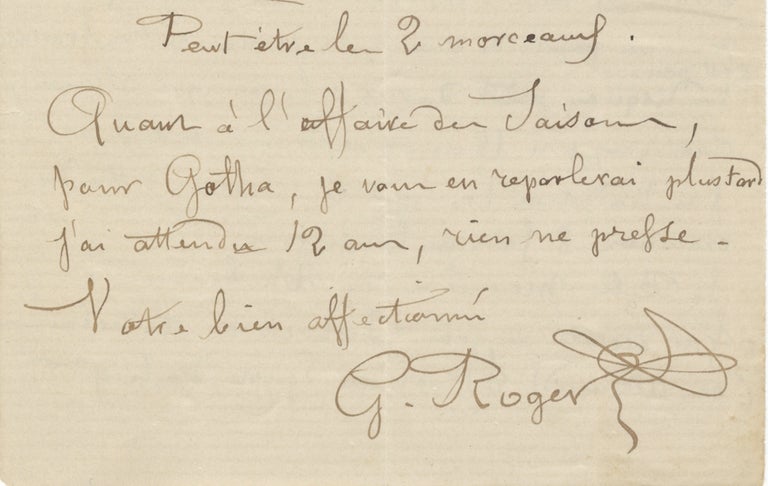
Autograph letter signed "G. Roger" to the Belgian poet and translator Gustave Oppelt (1817-1888)
3 pp. Octavo. Dated Chateau de Pray, Amboise, August 28 [no year, but most likely 1867]. In black ink. In French (with translation).
Roger thanks Oppelt for putting his name before a commission for a performance of Handel's Messiah. Although Gustave is not the native German they seek to sing this work in France, he believes his extensive experience translating and singing in German, as well as his vocal fitness, have prepared him for the job. He is asking 1,500 francs for two concerts, in which he can sing "the second great air of Joseph, which [he] has orchestrated, or Schubert's Erlkönig (in French or German), either with Berlioz's orchestration or with a first-class pianist." He will let Oppelt know about a performance of The Seasons in Gotha later.
"...They were counting, you tell me, on a German to sing this work in France. I do not deny that they have 25 years of experience with the great festivals but, from the point of view of French pronunciation, that's not much. Whereas from the point of view of German classical music, I have 18 years of experience and of performing there. I translated Haydn's Seasons into French, performed Schubert's Schöne Mullerin eight times at the Conservatory, performed Israel in Egypt at the great Festival in Rotterdam (in German), and Beethoven's Ninth Symphony with choruses, three big days of concerts, as in your country... "
Slightly worn and browned; creased at folds and lower left corner of third page; some edge tears; slight offsetting to blank portion of third page; annotations in pencil to upper portion of blank fourth page.
Roger was a noted French tenor. "In 1838 he made his début as Georges in Halévy’s L’éclair at the Opéra-Comique, where he subsequently created a number of roles written for him by Halévy, Auber and Thomas. His success rested on his considerable intelligence, fine bearing and pure tone. In 1846 he sang Faust in the first performance of Berlioz’s La damnation de Faust, and in 1848 he moved from the Opéra-Comique to the Opéra, where, in 1849, he created the role of Jean de Leyde in Meyerbeer’s Le prophète. Although his voice was too light for such parts, he had enormous success and continued to sing a number of leading tenor roles at the Opéra. He successfully toured Germany on several occasions. His most celebrated partners were Jenny Lind and Pauline Viardot, and he enjoyed the friendship of Berlioz, Meyerbeer and many literary figures. In 1859 he sang in Félicien David’s Herculanum at the Opéra, but shortly afterwards he lost his right arm in a shooting accident. For some years he continued to appear on stage with a mechanical arm, at the Opéra-Comique and in the provinces, and from 1868 until his death he was a professor of singing at the Conservatoire. His book Le carnet d’un ténor (1880) contains lively memories of his career, including an account of his visits to England in 1847 and 1848. In 1861 Berlioz orchestrated Schubert’s Erlkönig for him." Before the Franco-Prussian War of 1870-71, he also made several successful tours of Germany. Hugh Macdonald in Grove Music Online.
According to a notice in the Parisian periodical Le Minstrel (July 21, 1867, Vol. 34, No. 34, p. 272), Roger was in Ambroise in July of 1867
We would like to thank Mr. Matthew Cabajar for his kind assistance in the dating of this letter.
Item #24176
Price: $200.00 other currencies
